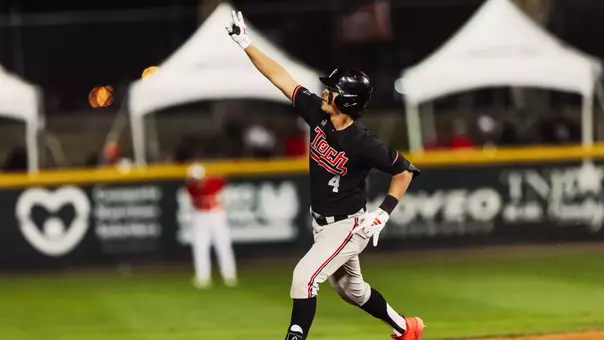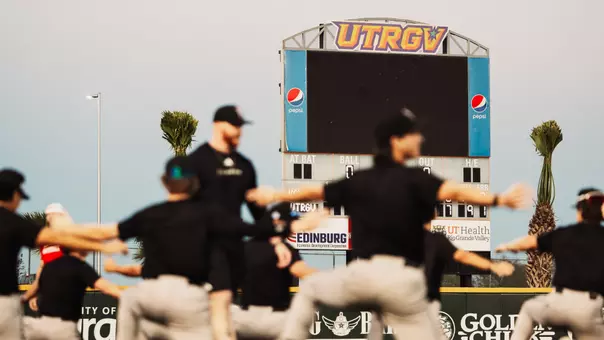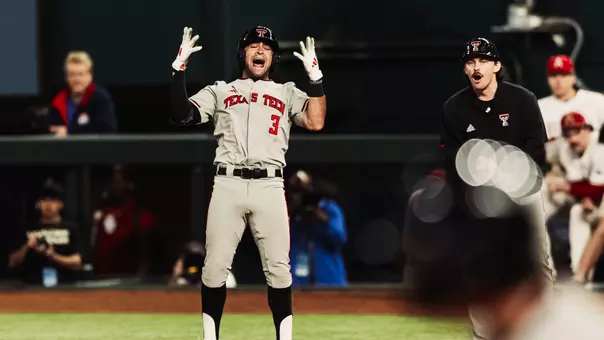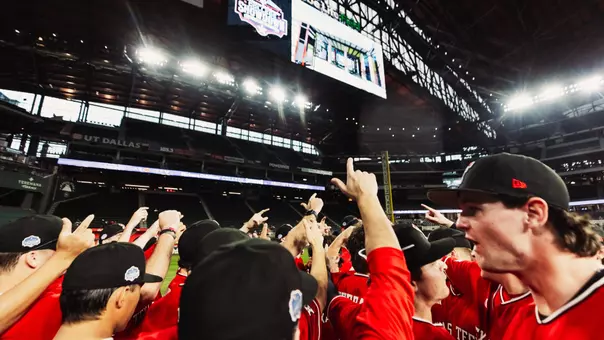Texas Tech University Athletics
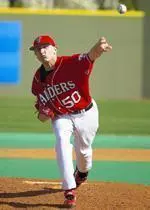
Former Red Raider Shining In The Pros
August 04, 2005 | Baseball
Aug. 4, 2005
Story Is Courtesy of Minorleaguebaseball.com
By Sapna Pathnak / MLB.com
Dallas Braden wasn't taken until the 24th round of the 2004 First-Year Player Draft, when the Oakland Athletics took the soft-tossing southpaw out of Texas Tech. But Braden has quickly risen through the A's system, going 19-6 with a 3.51 ERA in his first 34 professional games. Just shy of his 22nd birthday, Braden is one of the younger pitchers in the Texas League, and he's faring quite well, going 9-5 with a 3.73 ERA. His velocity has jumped from the mid-80s to close to 90 mph and he has struck out nearly a hitter per inning this year -- 134 Ks in 137 2/3 innings -- between Class A Stockton and Double-A Midland. As of August 3, he was the Minor League leader in victories with 15.
MiLB.com recently caught up with the Stockton, Calif., native and asked him about his keys to success, the pressure of pitching in the A's organization and how he spends his time during the offseason.
MiLB: Growing up in Stockton, were you an A's fan or a Giants fan?
Dallas Braden: An A's fan all the way. But I was also a huge Will Clark fan and to be able to go out and see him play was a big thrill.
MiLB: Were you aware of your name being in the middle of trade talks and how was that experience?
DB: I wasn't aware at all. A different agent, other than mine, called me and let me know. Peter Gammons had mentioned me on ESPN also and then my friends started calling me like, "You're getting traded, where are you going!?" it's nice to be in my first full year and already have my name on ESPN -- it was flattering but I'm not ready to leave Oakland just yet.
MiLB: You went to high school in Stockton and college at Texas Tech. This year, you've pitched at Stockton and Midland. Sacramento and Oakland are both within about an hour of Stockton. What do you think about the fact that you could make it to the Major Leagues without ever playing more than three hours from your previous homes?
DB: It's something that not everyone gets the chance to do. To think I could play in my hometown as a Major Leaguer, in my home state where I grew up, that's pretty ridiculous.
MiLB: What made you so successful (6-0, 2.68 ERA, 64 K in 43 2/3 IP) in the hitter-friendly Cal League?
DB: My fastball location, my command . . . I've been commanding my pitches all over the strike zone and I think that's really helped. My defense behind me is phenomenal, not to mention the timely hitting I've received at times when I was the pitcher of record.
MiLB: Billy Beane has said that if they'd been smart, they would have taken you even earlier in the draft. When did you think you'd be taken?
DB: Possibly on the first day. I had spoken to one of the scouts who asked me what I thought, and I told him it didn't matter -- last pick, last round, as long as I get to play. They also asked me what the lowest I would go before going back to school and I said 24th or lower. The next day I got a call saying I was picked in the 24th round. Go figure (laughs).
MiLB: Do you feel any additional pressure to become the next great young pitcher in the A's organization?
DB: Any added pressure? Not at all. The biggest thing [the Oakland organization] stresses is that as much as they'd like to see you in an A's uniform, there are 29 other teams out there looking for good pitchers. I don't feel like I have to be the next great Oakland pitcher specifically, I just want to get [to the Majors] and stay there.
MiLB: How have you adjusted to throwing so many innings in one season for the first time? Is this a tough time of year because of that?
DB: I'm in the process of adjusting to that. My arm hurts. In college I threw about 99 or 100 innings, which is about average, and then last year I pitched around 30 or 40 innings. But this year I've already thrown over 130 innings. It's a huge adjustment; I'm battling some demons right now. When your arm gets tired, it's harder to repeat, so I'm fighting through that. It's a character builder. You can be physically weak, but if you're mentally strong, you'll get through anything.
MiLB: What do you remember the most as far as baseball being a part of your childhood?
DB: We lived by a Little League diamond so I remember holding a baseball as soon as I was able to. Every chance I had to be around baseball, I was. We even moved so that I could play in more prestigious leagues. My mother made sure that every sacrifice was made so that I could play baseball.
MiLB: What is your favorite ballpark to pitch in?
DB: Frisco is really nice; it has a great atmosphere. The stands are packed every night, so it's lively. Nothing compares to playing at home, though. The hometown crowd can't be beat. I couldn't ask for more, especially with all the support we've gotten from the fans at home all year. It's by far my favorite place to pitch, but it wouldn't hurt my feelings if they moved that right field wall back a little (laughs).
MiLB: During the offseason, when you're not thinking about baseball as much, what's your favorite thing to do?
DB: I believe that it takes a village to raise a child, so in the offseason I am home with my family and friends in the place where I grew up. I'm a pretty laidback guy. I love to fish; I try to stay physically active too. Most of all, I spend as much time as I can with my grandmother, since it's just the two of us. I don't have a lot of family, so my friends are my family and the offseason is my time to be with them.
MiLB: Have you always pitched throughout your baseball career?
DB: For the most part, yes, but last season was the first time I never hit. I was a DH for quite some time in college and even played a little outfield, but not hitting has been a little weird for me.
MiLB: What is the best part about being a Minor League player?
DB: Lots of guys say they hate the traveling but I really like it. This wasn't something I was just handed. Getting into the Minors, that is. These experiences remind me of what our predecessors went through -- the bus rides, the hotels . . . these are the scenarios I imagined. The best part, though, is getting up everyday, putting on that uniform and playing a game that brings out the little kid in you and calling that my job.
MiLB: What is the best piece of advice you've ever received, baseball or non-baseball related?
DB: My mother at a very young age taught me that quitting is not an option. When she was sick with her melanoma, I really learned that. I can't even fathom the option of not trying, she always said once you start it, finish it; never ever give up or let go. It gets frustrating for some other people who try to make me understand it's my first year, but that's not acceptable. For me, there is no quitting. I don't know how to do it; it's not in me.
MiLB: What do you consider your biggest accomplishment thus far?
DB: Being on the prospects list, having upper management in the A's system open their eyes is great. I always thought I had it in me but to see it happen makes it real. The one thing that I do hold near to my heart is the last game I pitched in Stockton, it was the first complete game in ten years -- the fans on their feet when I got that last out; it was really touching.
MiLB: If you could change anything about the path that has gotten you to where you are today, would you?
DB: No way. I'm a firm believer that you are a product of your environment. For example, I left my hometown for reasons that weren't so good, but I came around full circle under better circumstances. You emanate the experiences you go through and everything happens for a reason, so I wouldn't change a thing.
MiLB: What advice do you give to young fans that want to follow in your footsteps?
DB: Adversity will be there everyday, but you quit the day you don't get up. You have to battle the adversity because it'll be a character builder when you come out on the other end. It may not end up the way you thought, but you'll be better for going through it.
MiLB: What are some weird superstitions you have before games?
DB: Nothing super weird, but one thing I have to do is take a 30 minute long shower before each start. From 5:00 to 5:30, it doesn't matter how clean I am, I'm not getting out for that full half hour.
Sapna Pathnak is a contributor to MLB.com. This story was not subject to the approval of the National Association of Professional Baseball Leagues or its clubs.


